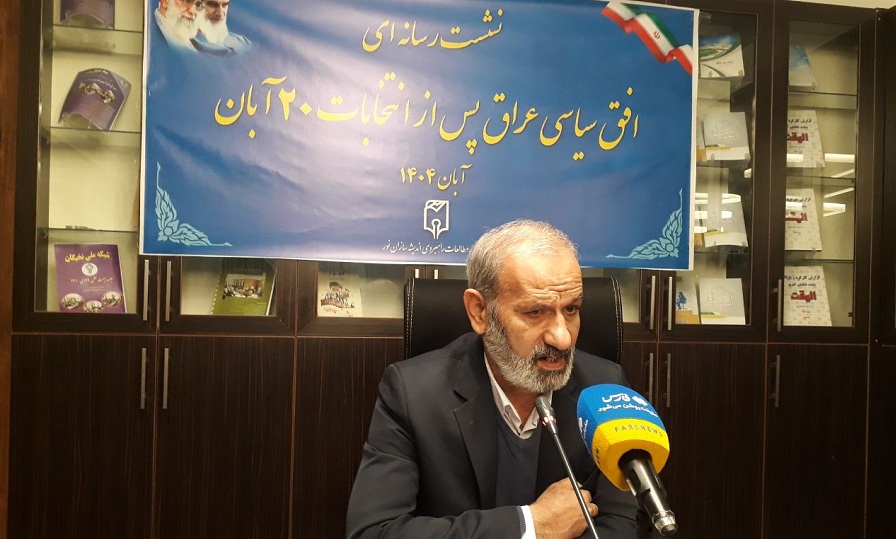Alwaght- The Tehran-based Andisheh Sazan-e-Nour Institute for Strategic Studies hosted a meeting discussing Iraq political landscape post-elections. At the meeting, senior West Asia affairs expert and director of the institute Saadullah Zaree brought in spotlight the current Iraqi developments in the shadow of the November 11 parliamentary elections.
Pointing to the recent Iraqi parliamentary vote, Mr Zaree said that last week elections were the sixth since dictatorship of Saddam Hussein fell in 2003. These elections saw a rise in turnout rate after rounds of downward trend. The increase was reported 15 percent compared to the last election and it is expected that Iraqi election situation will influence the elections in other regional countries, and actually this increase is seen effective regionally.
The political analyst added that the Iraqi parliamentary elections were held while resistance groups were engaged in a tense security situation against American forces, and there was an active and heated confrontation between the two camps. Since October 2023, following Hamas’s Operation Al-Aqsa Storm, we have witnessed this tense atmosphere across the entire resistance front against the United States and the Zionist regime. The Iraqi elections reflect the country's social condition and are, therefore, highly significant in summarizing the two-year confrontation between the branches of Axis of Resistance and their adversaries. The increased participation in the Iraqi elections demonstrated that, despite severe political, economic, and security pressures, the Iraqi people have not lost hope for a better future. Contrary to the Americans' assumption that the region would become passive to their plans, the region has, in fact, become more active. This indicates that people feel compelled to engage due to the threats, while also sensing that there is a capacity to overcome the tough circumstances.
Mr Zaree further held that the resistance has gained a better position between two fronts — regional and international— and its seats have increased to 90, up from the 30 seats in the current parliament. The leading faction of Iraqi resistance, Asaib Ahl Al-Haq led by Qais al-Khazali, as a coalition secured more seats. The faction alone gained 27 seats, up from the previous 18 seats.
He noted that other revolutionary and resistance-oriented movements, such as the Badr Organization, achieved a stronger position in these elections, stating that the Badr Organization secured 20 seats in this election. Furthermore, regarding other resistance factions, he added: "For instance, within the Prime Minister Mohammad Shia Al-Sudani's list, where 47 candidates successfully won votes, nearly 30 are resistance figures. Similarly, in ex-PM Nouri Al-Maliki's list, resistance elements hold a dominant presence. It is quite possible that the 'Resistance Bloc' could emerge as the largest coalition in the upcoming Iraqi parliament.
The director of the Iranian think tank further held that the Iraqi elections were held in a peaceful climate and this security is indicative of the political maturity of the Iraqis and their democracy. Now, he said, we should ask which Arab country allied to the US holds peaceful elections or which once holds elections at all. In the Iraqi elections, the people and parties participated in the elections equally and fairly and only three limits were set for participation: Verification of identity documents, non-affiliation with the Baathist Party, and non-affiliation with racist regimes like the Israeli regime.
The West Asia affairs expert also stressed that the recent Iraqi elections demonstrated that foreign money for interference is not effective in Iraq. Reports indicate that the Americans spent $2 billion, and the political maneuvers of the Trump administration, including dispatching an envoy to Iraq to threaten Iraqi groups, proved unsuccessful. This is because Trump's envoy delivered at least three warning messages to Iraqi factions in recent weeks, yet the election results were totally contrary to American plans. The Iraqi vote revealed the future trajectory of regional developments and proved that the position of the supporters and allies of the Axis of Resistance in the region, including in Yemen, Lebanon, and elsewhere, is similarly steadfast. This vote served as a gauge of weight of the resistance supporters against that of the pro-American camp in the region, with the results coming in favor of the resistance groups, though the Resistance camp will face threats post-elections and the US will push to advance its agenda through boosting its military presence in Iraq, despite the fact that even its military forces cannot do much against the will of the people of Iraq.



























